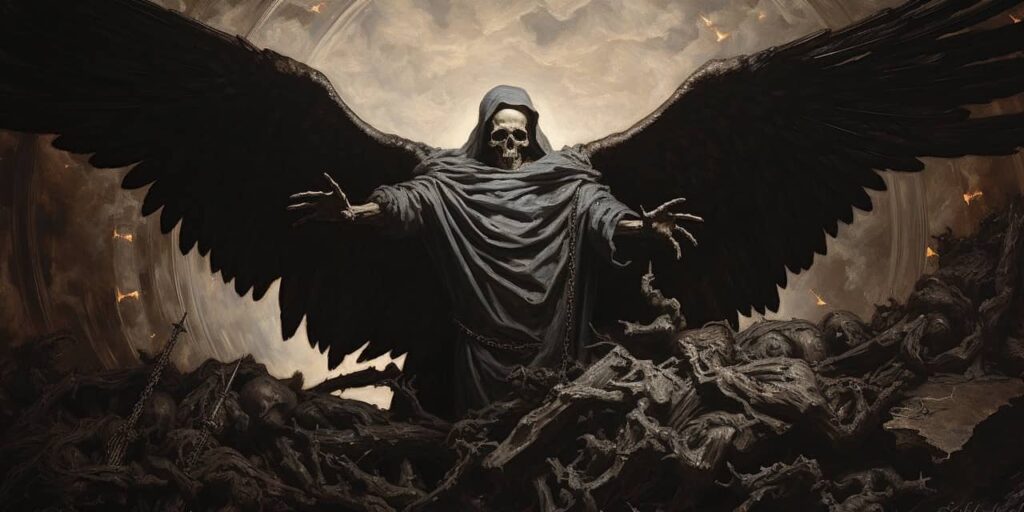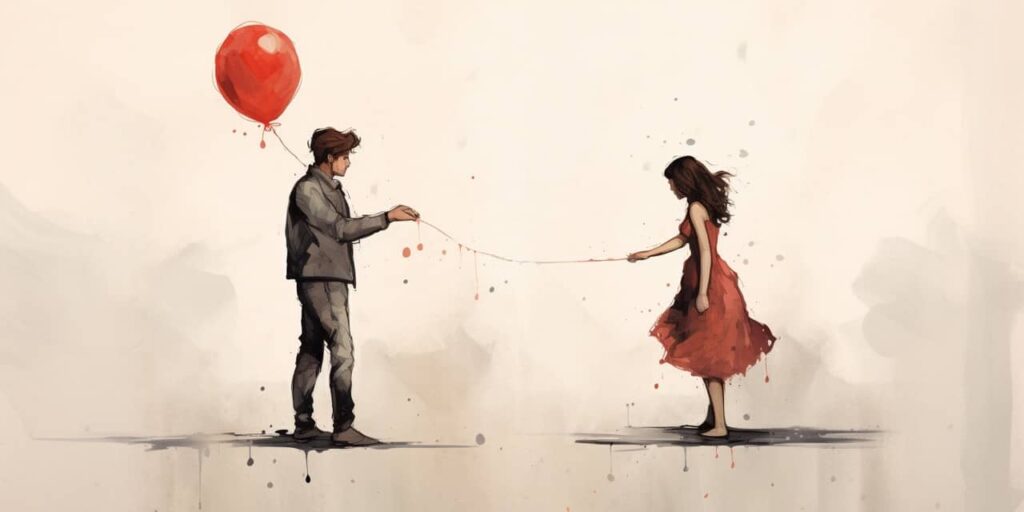It’s a universal truth, we’re all going to die. Yet, the fear of death — known as Thanatophobia — can be a debilitating and life-altering experience for many. It’s not the simple acknowledgment of this inevitability that defines Thanatophobia; instead, it’s an intense dread or anxiety over the thought of dying and what lies beyond.
As much as I wish I could say otherwise, none of us have a roadmap for what happens after our final breath. This uncertainty is often at the heart of most people’s fear of death. The unknown is daunting and can leave us feeling powerless and terrified.
But here’s an important fact to remember: Fear itself isn’t necessarily bad. It serves as a survival mechanism to protect us from harm. However, when fear begins to dictate our lives – especially about something as inevitable as death – it becomes problematic. Being afraid won’t stop the process; it’ll only rob you of the joy found in living fully today.
Understanding the Fear of Death
We’ve all felt it at some point, that cold shiver running down our spine when we think about death. But what’s really going on here? Why does the very thought of death induce such fear in us?
Scientifically speaking, it’s pretty straightforward. Our brains are hardwired for survival. So naturally, anything that threatens this existence triggers a fear response. That’s your body saying, “Hey, watch out! We’re not ready to go just yet.”
The anxiety around death isn’t just about our physical end though. There’s a deeper psychological aspect to it as well. We humans have an innate need for connection and meaning in our lives. The idea of losing these connections and meanings scares us.
To illustrate this point further:
- An estimated 20% of Americans have reported experiencing Thanatophobia (death anxiety) at some level.
- Studies suggest that women are more likely than men to experience this fear.
- According to research conducted by the University of Derby, UK, younger people tend to worry more about dying than older folks.
| Age Group | Percentage Reporting Fear |
|---|---|
| Younger | 25% |
| Older | 15% |
Societal norms also play a role in shaping our perceptions around death. For many cultures around the globe, discussions on death are considered taboo or negative – which can amplify existing fears.
That said, everyone experiences their own unique relationship with mortality based on personal beliefs and past experiences too. It’s important to understand that feeling scared is natural – it’s human nature after all.
In understanding our fear of death better, we can take steps towards addressing it – because while we may not be able to dodge the inevitable ending, we can certainly learn how to deal with its anticipation better.
Common Causes for Thanatophobia
It’s natural to have fear. Whether it’s the fear of heights, spiders or enclosed spaces, we all have something that sends a shiver down our spine. But imagine being afraid of something as inevitable as death – this is known as Thanatophobia.
While it may seem unusual, believe me when I say it isn’t. There are several reasons why someone might develop a fear of death, and they’re more common than you’d think. One significant factor is traumatic experiences. People who’ve had near-death experiences or witnessed someone else’s death often struggle with Thanatophobia.
Another cause can be chronic illness. If you’re constantly battling health issues and are acutely aware that your body isn’t 100% fit, it can lead to a heightened fear of dying.
Let’s not forget about existential crises either – those moments when you question the meaning and purpose of life can also trigger a deep-seated fear of death.
Here’s an interesting tidbit: there’s also evidence to suggest that people who suffer from severe anxiety and panic disorders are more likely to develop Thanatophobia.
- Traumatic Experiences
- Chronic Illness
- Existential Crises
- Anxiety Disorders
These aren’t the only causes – but they are some of the most common ones noted by psychologists across the globe. Remember though, each person is unique with their own set of experiences and circumstances influencing their fears.
So if you find yourself dealing with an intense fear of death – don’t worry; you’re not alone in this boat. Recognizing what might be causing your fear is the first step towards addressing it effectively.
Psychological Impact of Fear of Death
I’ve seen firsthand the emotional toll that fear of death can take on many individuals. It’s a daunting, even paralyzing topic for some. This deep-seated fear often leads to significant anxiety and stress levels, which can disrupt daily life activities and overall mental health.
Let’s delve into some specifics. Some people develop a condition known as “thanatophobia,” or an intense fear of dying. Those with this phobia often experience symptoms such as:
- Rapid heartbeat
- Shortness of breath
- Trembling
- Dry mouth
- Nausea
| Symptoms | Frequency |
|---|---|
| Rapid Heartbeat | Common |
| Shortness of Breath | Common |
| Trembling | Less common |
| Dry Mouth | Less common |
| Nausea | Rare |
Isn’t it astonishing how our minds react to the mere thought of mortality? The psychological effects don’t stop at physical symptoms either; there are cognitive implications too. People with a pervasive dread of death may have obsessive thoughts about dying, leading to difficulties in focusing or making decisions.
Moreover, I’ve noticed that individuals grappling with death anxiety might also exhibit avoidance behavior – steering clear from any conversations or situations associated with death. This could result in social isolation and strained relationships.
In my research on this subject matter, I’ve come across studies indicating that the fear of death could potentially trigger or exacerbate existing mental health conditions like depression and post-traumatic stress disorder (PTSD).
It’s important we understand these impacts so we can better support those struggling with their mortality fears. Remember, if you’re wrestling with these feelings yourself – you’re not alone and help is available.
Societal Perspective on Death and Dying
Death, it’s an inevitable part of life that we all must face. Yet, society’s views on this final journey often vary greatly depending upon cultural context and personal beliefs. In some societies, death is embraced as a natural transition to another phase of existence, while in others it’s feared as the end of everything.
For instance, let’s take a look at Western societies where death tends to be viewed with fear or apprehension. Often times there’s an emphasis on youth and vitality, pushing thoughts of mortality to the back burner. In contrast, in many Eastern cultures like Japan or India, it isn’t uncommon for people to openly discuss their own death and dying process.
A study by the Pew Research Center explores these differences further:
| Culture | Viewpoint on Death |
|---|---|
| Western | Fear/Apprehension |
| Eastern | Acceptance |
But why do such contrasts exist? Partly because societal norms shape our understanding of death from an early age. For example:
- Children in the West are often shielded from discussions about death.
- Conversely, kids in certain Asian cultures may participate in funeral rituals.
Such experiences undoubtedly impact our perceptions about life’s ultimate finale. Furthermore, religious beliefs play a significant role too. Some religions offer comforting visions of afterlife which can reduce fear associated with dying.
However you slice it though – whether you’re confronting your own mortality or helping someone else through their journey – understanding societal attitudes towards death can be invaluable. It helps us navigate through grief and loss while also providing insight into how different cultures honor those who have passed away.
How to Recognize Symptoms of Thanatophobia
Let’s delve into the world of thanatophobia, a term that may sound complex but simply refers to an intense fear of death. It’s a condition not often talked about, yet it affects many people in various degrees and forms.
So how do you know if someone, perhaps even yourself, is grappling with thanatophobia? Certain symptoms can shed light on this. For starters, individuals struggling with this phobia might exhibit excessive worrying about dying or persistent thoughts related to death. This could manifest as a constant need for reassurance about health-related issues or repeatedly voicing concerns over mortality.
Physical signs are also common indicators and should not be overlooked. These include palpitations, shortness of breath, trembling or sweating when confronted with triggers related to death or dying. On top of these physical manifestations, there could be behavioral changes such as avoidance behaviors where individuals steer clear from situations reminding them of death like hospitals or funerals.
Apart from the above key signs, let me share some nuanced symptoms that might go unnoticed:
- Sleep disturbances: Someone with thanatophobia might have trouble sleeping due to recurring nightmares about death.
- Hypochondria: An individual could become excessively worried about their health and interpret minor ailments as signs of serious illnesses.
- Social isolation: People dealing with thanatophobia might withdraw socially because they’re preoccupied with thoughts of mortality.
Remember that everyone’s experience varies; what one person feels may not hold true for another. The list provided here serves as a general guide rather than a definitive diagnosis tool. If you notice these symptoms in yourself or someone you know, don’t hesitate to seek professional help — it’s never too early nor too late!
Professional Therapies for Overcoming Death Anxiety
Now, let’s dive into the realm of professional therapies aimed at overcoming death anxiety. These treatments are designed by experts who comprehend the nuances of our fears and anxieties. They utilize their knowledge to help us navigate our mental landscape and find peace with our mortality.
One notable therapy is Cognitive-Behavioral Therapy (CBT). It’s a popular choice among professionals due to its effectiveness in changing maladaptive thought patterns. CBT helps individuals identify and challenge their fearful thoughts about death, replacing them with healthier perspectives.
Another therapeutic approach is Existential Therapy, which encourages people to confront death anxiety head-on by examining its sources. This therapy promotes acceptance of one’s mortality as part of life’s journey, thereby reducing the fear associated with it.
Here are some stats that back up these therapies:
| Therapy | Effectiveness Rate |
|---|---|
| CBT | 60-70% |
| Existential Therapy | 50-60% |
Mindfulness-Based Stress Reduction (MBSR) also plays a significant role in this context. The technique focuses on present moment awareness, promoting clarity and calmness amid life’s uncertainties including death.
Exposure Therapy can be beneficial too – it gradually exposes individuals to their fear, in this case, the concept of dying. This exposure helps decrease sensitivity over time and aids in managing reactions towards such situations.
Let me mention Art Therapy here as well; it allows people to express their fears creatively which often leads to emotional release and improved understanding of their feelings about mortality.
Remember though, choosing a therapy depends on individual needs and comfort levels. While these professional methods have been proven effective for many people grappling with death anxiety, it’s always best to consult with a mental health professional before starting any treatment plan.
Self-Help Strategies to Cope with Fear of Death
I’ve discovered that it’s completely normal to feel a certain level of fear when thinking about death. After all, it’s an aspect of life that we don’t fully understand. But sometimes, this fear can become overwhelming and interfere with our daily lives. Thankfully, there are several self-help strategies you can use to help manage this fear.
Mindfulness and meditation have been proven to be incredibly effective in managing fears and anxieties of all types. By focusing on the present moment, we’re able to quiet those incessant worries about the unknowns of the future or the inevitability of death. I’ve personally found apps like Headspace or Calm very helpful for guided meditations.
Another strategy is cognitive behavioral therapy (CBT) techniques which you can try out at home. These include challenging your thoughts about death, testing out your assumptions, and modifying your behaviors accordingly.
Here are some examples:
- Thought Challenge: Ask yourself if your fear is rational.
- Assumption Test: Try living as if you weren’t afraid—does anything change?
- Behavior Modification: Avoid negative triggers such as watching violent movies or news before bed.
Engaging in activities that give you a sense of purpose and joy can also alleviate fears about death. It could be something simple like gardening or reading books; doing what makes us happy gives us a stronger connection with life.
Lastly, talking openly about death has been shown to reduce its associated fears substantially because it helps dispel myths and misconceptions around it. If possible, consider joining support groups where people share their experiences and coping mechanisms – these interactions often provide fresh perspectives on handling the fear of mortality.
Remember, each person’s journey is unique – so take time finding what works best for you.
Conclusion: Embracing Life Beyond the Fear
We’ve journeyed through the maze of death anxiety, unraveling its causes and effects. It’s now time to shift our focus towards embracing life beyond this fear.
Life is full of uncertainties and death might be the most significant one. Yet, it’s essential to remember that fear doesn’t have to govern our existence. We can cope effectively with Thanatophobia by maintaining a balanced perspective about life and death.
Let’s look at a few strategies:
- Living in the present: By focusing on the here-and-now, we prevent ourselves from getting lost in worrying about what lies ahead.
- Practicing mindfulness: This helps us build resilience against anxiety-provoking thoughts.
- Seek professional help if needed: Therapists or counselors can provide effective coping mechanisms tailored specifically for you.
Remember, it’s not unusual to contemplate mortality. It becomes problematic only when it starts interfering with our daily lives.
In essence, death isn’t something we should obsess over. Instead, let it serve as a reminder of how precious life is – urging us to make every moment count.
Ultimately, overcoming fear of death is less about denying its inevitability and more about embracing the beauty of life’s impermanence. I believe that once we accept this fact wholeheartedly, we’ll begin cherishing each day as a unique gift rather than living under constant dread.
Life is too short for regrets or fears – so let’s go out there and live it!



